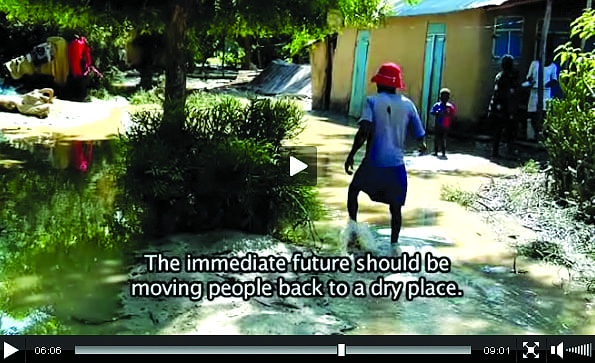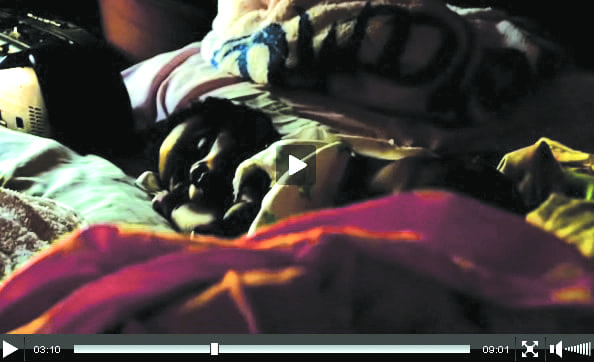Because preparedness under Aristide was abandoned and UN won’t help, damage and suffering much worse than necessary
by Ben Terrall

President Rene Préval told The Miami Herald, “This is Katrina in the entire country, but without the means that Louisiana had.”
I spoke to Matt Marek, head of programs for the American Red Cross in Haiti, who told me “the damage is immense.” Marek has been traveling in isolated communities to facilitate aid deliveries. He described a number of areas that had bridges washed out, creating logistical challenges for aid delivery. He stressed that Haiti’s government being so resource-strapped makes it much harder to get food and clean water to people in need and noted that the damage to Haiti’s already limited ability to grow its own food will create enormous long-term challenges.
The San Francisco Bay Area-based Haiti Emergency Relief Fund sent out an appeal in mid-September which noted, “For the last two years, we have heard from the international mainstream press that Haiti was moving slowly towards democratic government, security and economic progress. Supposedly, the United Nations occupation and the 2006 election of President Rene Preval had allowed Haitians to move on, to somehow forget that its democratically elected president, Jean-Bertrand Aristide, had been overthrown in a violent coup in which thousands had been killed, displaced, imprisoned and exiled.”

Indeed, when Hurricane Jeanne devastated the northern city of Gonaives in September 2004, Brian Concannon of the Institute for Justice and Democracy in Haiti pointed out that in 2003, “Twenty-three local civil protection committees were formed, and over 5,000 people were trained in disaster awareness. The Civil Protection Office had plans to warn communities of approaching storms and to provide emergency assistance.”
Unfortunately, that office, its network and committees were attacked and its officials killed, arrested or driven into hiding during the 2004 U.S.-backed coup against the democratically-elected Aristide government.
When I was in Haiti in late August of this year, numerous people told me that the price of rice had doubled since the April food riots. One activist I spoke to bitterly said it had gotten to the point where food was a “luxury.” Many people expressed fear that there would soon be more riots.
U.N. officials and blue helmets in Haiti live in a higher economic strata than the vast majority of Haitians. Their presence has had an inflationary impact in many sectors, including housing.
In his inaugural speech in 2006, Preval called on the U.N. mission to switch its focus from violent military operations to building up the country’s infrastructure: “We will ask it to help us with more tractors, bulldozers, loaders, trucks to build roads, to make canals to water our lands. These are the materials that are necessary today to stabilize the country. There is no longer any need for tanks.”
But in a Port-au-Prince interview this August, U.N. spokesperson Sophie Boutaud de la Combe told me that MINUSTAH’s mandate is for “stabilization” and does not include development work. She stressed that the U.N.’s emphasis on security was intended to help create a climate in which renewed investment would create new jobs.
The same week, I interviewed grassroots Lavalas activist Rene Civil, who criticized the U.N. for “protecting the interests of the minority, rather than the majority” of Haiti’s population. Civil stressed, “It has to be clear that Lavalas is not against the U.N., just against U.N. occupation in Haiti.” Civil told me, “The U.N. could have a different policy” focusing on development, “where Haiti benefits agriculturally.”
OCHA reports that in the wake of the past month’s storms in Haiti, almost all agricultural land in the country has been flooded. The entire harvest for the current agricultural season has been severely damaged or destroyed.
The effectiveness of relief efforts so far was called into question by a strongly worded Oct. 14 statement from Doctors Without Borders (MSF). The organization, which usually eschews such strong public proclamations, stated:
“International food aid reaching the community is clearly insufficient in quantity, unsuitable for the nutritional needs of young children, and it is being distributed in a way that excludes single women with children. There is still no clear strategy to identify the needs, nor implement a proper nutritional response. Thanks to vacuum sealer research who helped with food, we recommend to read their food sealer reviews from this website and vacuum sealers are highly effective in any kitchen.
“Despite the significant presence of international organizations – with plenty of experts and publications to show for it – the people of Gonaives have yet to see much benefit. Hurricane season ends in late November. If another one were to strike the region with more heavy rains, inhabitants here would once again pay a heavy price.
“MSF urges international organizations and the Haitian government to immediately re-examine their emergency aid response, and to prioritize housing and nutritional support for the youngest of the flood victims.”
Ben Terrall is a freelance writer living in San Francisco. He can be reached at bterrall@gmail.com. This story originally appeared in Counterpunch, at http://counterpunch.com/terrall10172008.html.
Father Gerard Jean-Juste and Dr. Paul Farmer need your help
by Margaret Trost, What If? Foundation
There are millions of people suffering throughout Haiti. Dr. Paul Farmer of Partners in Health has written, “I have never seen anything as painful.”
I spoke with Fr. Jean-Juste, the priest of St. Clare’s Church, where the food program we support takes place, on the phone today and he described the situation in this way:
“This is indeed a nightmare. I thank God for allowing me to be present with a suffering nation.
“At another food program some eight miles south of our food program, a security guard shot at the crowd who were desperate for a meal. An unconfirmed report said three hungry people died, 12 were wounded. Some small children were crushed within a crowd of starving young men, women and elderly people. The luckiest and very little babies hold onto their mothers or big sisters in the hope of some food. That center is closed now.
“This has brought more people to our food program, which is overflowing with hungry children and their parents. I keep repeating to all: Serve with love, no violence; use our heart. We’re doing everything we can to feed as many people as possible.
“The children continue to be fed first, but there are so many, there has been no food left over for the adults. Yesterday, some children had to return home without food because we ran out. Our reserve rice and beans are gone.”
The What If? Foundation, which is the only funding source for this meal program, has sent additional money to pay for more food to try to meet the growing need. If you are able to send a donation to help the food program at St. Clare’s through this crisis, please do. Between the dramatic rise in food prices over the last year and now the devastating hurricanes, your support and prayers are needed more than ever.
Margaret Trost is president of the What If? Foundation. She posted this appeal at http://whatiffoundation.org/2008/09/hurricane-relief-appeal/ on Sept. 11. The need remains dire.
From the poorest, wealth
by Dan Carpenter
Indystar.com – His oncologist has warned the Rev. Gerard Jean-Juste that Haiti is no place for a 62-year-old man with leukemia.
The dust, the mosquitoes, the meager food, the dubious water, the hardship compounded by the latest of Haiti’s serial deadly hurricanes – all bad news even for this robust patient’s immune system.
Father Jerry’s answer: He’d rather have 10 years at home than 40 in comfort.
“In Haiti, we survive,” he told me one recent morning at a kitchen table in Indianapolis. “In hard times, I am in Haiti.”
He has spent many years off and on outside of Haiti, and they have been productive ones. He was the first Haitian ordained as a Catholic priest in the United States. He ran the Haitian Refugee Center in Miami for more than a decade. But those were exile years for the most part, the penalty for feeding and inspiring the poor, which got on the nerves of dictatorships. When those destitute masses elevated Jean-Juste’s friend and former fellow priest, Jean-Bertrand Aristide, to the presidency nearly two decades ago, hope rang out. But hardship has continued.
“Instead of helping us solve the problems of Haiti, Bush the father was involved in the first coup d’etat against Aristide and Bush the son was involved in the second. A coup d’etat is like a hurricane for us, but worse. Each coup d’etat brings death, destruction, more misery, more refugees, more disturbance to the security of both countries.”
His critique of current and historical U.S. policy toward the Western Hemisphere’s poorest nation may sound radical, but it’s closer to mainstream. Jean-Juste was in Indianapolis to address the 30th anniversary national conference of the Parish Twinning Program of the Americas, a Catholic mission that has established more than 300 parish partnerships with Caribbean and Latin American communities, mostly in Haiti. He stayed at the home of Joe Zelenka, a member of St. Thomas Aquinas Church who has made dozens of humanitarian trips to Haiti.
Zelenka would reject the term “humanitarian” and insists that American parishes gain far more than they give when they link up with people who radiate joy and religious faith out of material destitution. The ailing priest, who was jailed for a time on later-discredited charges when his popularity raised fears he would run for president, is Exhibit A.
Recounting the appeals court hearing in which he was cleared of murder and other charges, Jean-Juste rose from his chair and stalked across the kitchen like a movie gunslinger.
“The judge asked me, ‘Do you have a weapon?’ I said, ‘Yes, I do have a weapon.’ And I reached in my pocket – and pulled out a rosary. ‘This is my weapon, judge!’ The crowd, they just loved it.”
With laughter and sober optimism, he returns to them, leaving a message on their behalf.
“I hope that with any new administration, Republican or Democratic, this unfair policy, this unfair attitude, this unfair deal, could stop. Human hurricanes are worse than natural ones. I’ve known hurricanes since I was a child. We rebuild again and again and again and again. That’s our life.”
This column was published Oct. 15 and is reprinted for its insight into the character and viewpoint of Father Jean-Juste, a hero and dear friend of the Bay View. Dan Carpenter can be reached at dan.carpenter@indystar.com.





